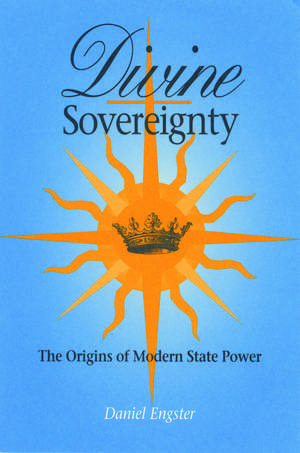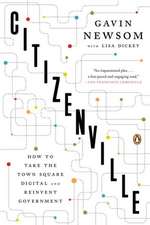Divine Sovereignty: The Origins of Modern State Power
Autor Daniel Engsteren Limba Engleză Hardback – 31 iul 2001
How did the modern state become the Leviathan that Hobbes described? Engster challenges the common assertion that the state emerged from a new secular philosophy at the time of the Renaissance. He argues instead that early modern theorists legitimized state power by portraying it as a sanctified force for moral order within an otherwise secular and contingent world.
Engster traces the modern development of state authority to the breakdown of medieval ideas of order encompassed in the "great chain of being." He then shows how sixteenth- and seventeenth-century writers and statesmen such as Montaigne, Bodin, Richelieu, Bossuet, and Hobbes redefined the main principles of the state—including legislative sovereignty, executive prerogative, governmental regulation, and bureaucratic rationality—in ways that underlie state organization even today.
Providing a broad synthesis of early modern state theory and practice, Divine Sovereignty suggests that these writers envisioned the state as the center of divine and natural order in a world that had strayed from divine guidance. In revealing how early modern theorists and statesmen justified the new powers of their Leviathan, Engster also illuminates conflicts and paradoxes within the modern nation-state.
Engster traces the modern development of state authority to the breakdown of medieval ideas of order encompassed in the "great chain of being." He then shows how sixteenth- and seventeenth-century writers and statesmen such as Montaigne, Bodin, Richelieu, Bossuet, and Hobbes redefined the main principles of the state—including legislative sovereignty, executive prerogative, governmental regulation, and bureaucratic rationality—in ways that underlie state organization even today.
Providing a broad synthesis of early modern state theory and practice, Divine Sovereignty suggests that these writers envisioned the state as the center of divine and natural order in a world that had strayed from divine guidance. In revealing how early modern theorists and statesmen justified the new powers of their Leviathan, Engster also illuminates conflicts and paradoxes within the modern nation-state.
Preț: 406.40 lei
Nou
Puncte Express: 610
Preț estimativ în valută:
77.77€ • 80.70$ • 65.01£
77.77€ • 80.70$ • 65.01£
Carte tipărită la comandă
Livrare economică 17-31 martie
Preluare comenzi: 021 569.72.76
Specificații
ISBN-13: 9780875802756
ISBN-10: 0875802753
Pagini: 267
Dimensiuni: 152 x 229 x 25 mm
Greutate: 0.59 kg
Ediția:1
Editura: Northern Illinois University Press
Colecția Northern Illinois University Press
ISBN-10: 0875802753
Pagini: 267
Dimensiuni: 152 x 229 x 25 mm
Greutate: 0.59 kg
Ediția:1
Editura: Northern Illinois University Press
Colecția Northern Illinois University Press
Recenzii
"Elegantly written ... an innovative contribution to the literature on the origins of the modern state."
—Maurizio Viroli, Princeton University
"Illuminating."—Choice
—Maurizio Viroli, Princeton University
"Illuminating."—Choice
Notă biografică
Daniel Engster is Assistant Professor of Political Science at the University of Texas, San Antonio.
Cuprins
Table of Contents
Introduction
1. The Montaignian Moment
2. Jean Bodin
3. Cardinal Richelieu and the Birth of Modern Executive Power
4. Louis XIV and the Ideology of the Regulatory State
5. English State Theory
Conclusion
Notes
Works Cited
Index
1. The Montaignian Moment
2. Jean Bodin
3. Cardinal Richelieu and the Birth of Modern Executive Power
4. Louis XIV and the Ideology of the Regulatory State
5. English State Theory
Conclusion
Notes
Works Cited
Index
Descriere
How did the modern state become the Leviathan that Hobbes described? Engster challenges the common assertion that the state emerged from a new secular philosophy at the time of the Renaissance. He argues instead that early modern theorists legitimized state power by portraying it as a sanctified force for moral order within an otherwise secular and contingent world.
Engster traces the modern development of state authority to the breakdown of medieval ideas of order encompassed in the "great chain of being." He then shows how sixteenth- and seventeenth-century writers and statesmen such as Montaigne, Bodin, Richelieu, Bossuet, and Hobbes redefined the main principles of the state—including legislative sovereignty, executive prerogative, governmental regulation, and bureaucratic rationality—in ways that underlie state organization even today.
Providing a broad synthesis of early modern state theory and practice, Divine Sovereignty suggests that these writers envisioned the state as the center of divine and natural order in a world that had strayed from divine guidance. In revealing how early modern theorists and statesmen justified the new powers of their Leviathan, Engster also illuminates conflicts and paradoxes within the modern nation-state.
Engster traces the modern development of state authority to the breakdown of medieval ideas of order encompassed in the "great chain of being." He then shows how sixteenth- and seventeenth-century writers and statesmen such as Montaigne, Bodin, Richelieu, Bossuet, and Hobbes redefined the main principles of the state—including legislative sovereignty, executive prerogative, governmental regulation, and bureaucratic rationality—in ways that underlie state organization even today.
Providing a broad synthesis of early modern state theory and practice, Divine Sovereignty suggests that these writers envisioned the state as the center of divine and natural order in a world that had strayed from divine guidance. In revealing how early modern theorists and statesmen justified the new powers of their Leviathan, Engster also illuminates conflicts and paradoxes within the modern nation-state.











